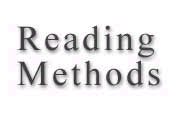
Set up a schedule. Allocate more time for the most difficult classes. Make sure that you allot time for recreation and social activities. (You need to reward yourself for your hard work!) And follow your schedule.
Start studying for 10-15 minutes at a time and then build up for longer periods of time. Most study skill programs suggest reading for 15 minutes to an hour at a stretch. Then work towards reading for longer periods of time. Just remember to be realistic. If you can no longer concentrate or remember what you have read, stop. There's no sense in wasting your valuable time.
|
|
Take breaks when studying. The average attention span for one task is approximately 20 minutes. Do not attempt to cram! Study small portions of material, take a break and then study some more. We retain a great deal more if we learn in small manageable portions, than when we attempt to learn a great deal of information at once. Make these breaks mandatory. Even if you are enjoying your reading or studying, take some breaks. You do not want to get burned out.
Reward yourself for studying, learning a difficult concept, or completing a project. Go to a movie, spend time with your friends, or do the things you put off in order to study. This reinforces your behaviour. You are more likely to study again and concentrate if you know there is a reward at the end of completing a task.
Where you study influences your concentration and your study habits as well. Make sure you are comfortable, but not too comfortable. Sitting at a desk is preferable to lying in bed. Use the same place for studying: This will help you associate that particular location with studying and will facilitate concentration.
Seeking a quiet well-lit study area is equally important. A radio blaring in the background, a stereo blaring next door, and the sounds of an interesting conversation are but a few of the factors that can disturb a study area.
Some of the more common distractions are telephone calls or friends and family stopping by to chat. Put up the newspapers, magazines, and unfinished projects. Once you become aware of these simple distractions, you can eliminate them and improve your study skills.
Remember that memory is "Context and State Dependent". Studying in a physical situation and similar to the one in which you will be tested increases your chances to recall information. Studying in an emotional mood similar to the one you experience during tests increases your chances to recall studied information. When studying, keep the same focus and enhanced attention you have in your tests.
You need to increase your concentration and activation levels while studying to increase your chances to recall the studied material when tested. The reverse is applicable to tests. If you get too psyched-up or tensed-up during your tests, you will not be able to recall your material because your test mood state will not match your studying mood. This is the reason why it is so important to calm down in a testing situation.
Some classes require more work or effort than others. For example, maths and languages are subjects which require daily work. Because these classes require knowledge of basic material which then builds up. If you don't keep up the foundation you'll be lost at a later stage.